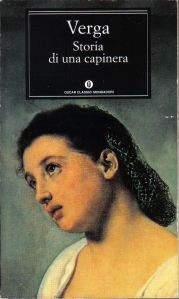I have set myself the challenge of translating ‘Storia di una Capinera’ by Giovanni Verga into English at the rate of one word a day.

Avevo visto una povera capinera chiusa in gabbia: era timide, triste, malaticcia ci guardava con occhio spaventato; . . .
___________
The story so far
(Original text)
Storia di una capinera
Avevo visto una povera capinera chiusa in gabbia: era timide, triste, malaticcia ci guardava con occhio spaventato; si rifuggiava in un angolo della sua gabbia, e allorché udiva il canto allegro degli altri uccelletti che cinguettavano sul verde del prato o nell’azzurro del cielo, li seguiva con uno sguardo che avrebbe potuto dirsi pieno di lagrime. Ma non osava ribellarsi, non osava tentare di rompere il fil di ferro che la teneva carcerata, la povera prigioniera. Eppure i suoi custodi, le volevano bene, cari bambini che si trastullavano col suo dolore e le pagavano la sua malinconia con miche di pane e con parole gentili. La povera capinera cercava rassegnarsi, la meschinella; non era cattiva; non voleva rimproverarli neanche col suo dolore, poiché tentava di beccare tristamente quel miglio e quelle miche di pane; ma non poteva inghiottirle. Dopo due giorni chinò la testa sotto l’ala e l’indomani fu trovata stecchita nella sua prigione.
Era morta, povera capinera! Eppure il suo scodellino era pieno. Era morta perché in quel corpicino c’era qualche cosa che non si nutriva soltanto di miglio, e che soffriva qualche cosa oltre la fame e la sete.
Allorché la madre dei due bimbi, innocenti e spietati carnefici del povero uccelletto, mi narrò la storia di un’infelice di cui mura del chiostro avevano imprigionato il corpo, e la superstizione e l’amore avevano torturato lo spirito: una di quelle intime storie, che passano inosservate tutti i giorni, storia di un cuore tenero, timido, che aveva amato e pianto e pregato senza osare di far scorgere le sue lagrime o di far sentire la sua preghiera; che infine si era chiuso nel suo dolore ed era morto; io pensai alla povera capinera che guardava il cielo attraverso le gretole della prigione; che non cantava; che beccava tristamente il suo miglio; che aveva piegato la testolina sotto l’ala ed era morta.
Ecco perché l’ho . . .
___________
Today’s new word
ho (verb: present indicative) = I have
___________
A little bit of grammar
ho is the 1st person singular of the present indicative (1° persona singolare dell’indicativo presente) of the verb avere.
The present indicative of the verb avere:
ho – I have
hai – you have
ha – he, she, it has, you (formal) have
abbiamo – we have
avete – you have
hanno – they have, you (formal) have
___________
Example of use in a sentence
Con la Juventus ho imparato a vincere.
=
With Juventus I have learnt to win.
___________
My Translation
Story of a blackcap
By Giovanni Verga
(translated by Eddie Bosticco)
I had seen a poor blackcap locked in a cage: shy, sad and sickly, she watched us with terrified eyes. She cowered in the corner of her cage and on hearing the joyful singing of the other small birds in the green meadow and in the blue sky, her gaze followed the sound with an expression that one would say was full of tears. But she dared not rebel, she dared not try to break the iron wire that held her captive, the poor prisoner. And yet her wardens, dear children, loved her. They amused themselves with her suffering and rewarded her for her distress with crumbs of bread and kind words. The poor blackcap was trying to adapt, pathetic little wretch; she was not bad; she did not want to reproach them not even with her distress, after all she was desperately trying to peck at the millet and the bread crumbs, but she could not to swallow them. After two days she tucked her head under her wing and the following day she was found cold and stiff in her prison.
She was dead! Poor little blackcap! Yet, her little bowl was full. She was dead because there was something in that tiny body that did not feed on millet alone, and that was suffering something more than hunger and thirst.
When the mother of the two children, the innocent and cruel torturers of the poor little bird, told me the story of an unfortunate whose body had been imprisoned by cloister walls and whose spirit had been tortured by superstition and love: one of those personal dramas that take place, unobserved, every day; the story of a tender, timid heart that had loved and cried and prayed without daring to let her tears be seen or her prayer be heard; and that; finally; she had locked herself in her suffering and had died; I thought of the poor blackcap that was staring up at the sky through the bars of her prison; that was not singing; that was sadly pecking at her millet; that had folded her little head under her wing and was dead.
That is why it I have . . .
___________
Translator’s Notes
The current sentence is long and obscure when translated word by word (and word for word). It will become clearer as more words are translated and rearranged into a more recognizable English structure.
___________
Navigation
|
|
Previous Italian Word of the Day: l’ |
Next Italian Word of the Day: intitolata |
|
___________
If you would like to follow this story from the first word, please click here:
If you would like to take a peep at the vocabulary so far, please click here:
___________

